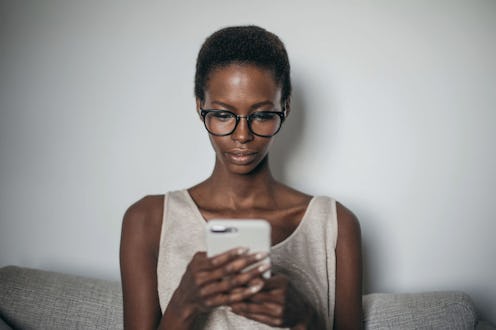Life
The Light From Your Phone Is Causing SO Much Damage To Your Eyes, New Study Finds

This probably isn't the most pleasant article to come across on your phone/laptop, but facts are facts: according to a new study, the blue light from your phone can accelerate blindness (and laptops and tablets are similarly culpable). The Guardian reports that prolonged exposure to blue light can advance the process of macular degeneration, as researchers from the University of Toledo discovered. Are you side-eyeing your phone yet?
As the Guardian reports, the University of Toledo study concluded that exposure to blue light "triggers poisonous molecules to be generated in the eye’s light-sensitive cells that can cause macular degeneration — an incurable condition that affects the middle part of vision." Blue light is particularly damaging, the paper says, because it "has a shorter wavelength and more energy compared with other colours."
Dr. Ajith Karunarathne, an assistant chemistry and biochemistry professor and study co-author, said, "We are being exposed to blue light continuously and the eye’s cornea and lens cannot block or reflect it." He continued, "It’s no secret that blue light harms our vision by damaging the eye’s retina. Our experiments explain how this happens, and we hope this leads to therapies that slow macular degeneration, such as a new kind of eye drop."
So what exactly is macular degeneration? It's a "common condition among those in their 50s and 60s that results in significant vision loss," the Guardian explains, adding, "It is caused by the death of photoreceptor, ie. light-sensitive cells, in the retina."
And just to dash any remaining optimism you may have, Ph.D. student and study contributor Kasun Ratnayake offered the following: "Photoreceptor cells do not regenerate in the eye. When they’re dead, they’re dead for good." Fantastic!
This isn't the first time digitally-emitted blue light has come under scrutiny. As the Independent reports, exposure to blue light during the evening can disrupt our body clocks and interfere with sleep. "Screens produce a bright light which can stop the body producing melatonin — the sleep hormone — which is produced naturally as the evening becomes darker," the newspaper says. "Blue and green wavelengths of light affect the production of melatonin the most, as well as raising alertness in people at a time when they should be feeling sleepier." And according to the cited study, written by Professor Paul Gringras and published in Frontiers in Public Health, newer devices emit more blue light than older models, suggesting our sleep problems might only get worse.
So what can we do to salvage our sleep and preserve our eyesight? The Guardian reports that Dr. Ajith Karunarathne "advises wearing sunglasses that can filter both UV and blue light outside and avoiding browsing on mobile phones or tablets in the dark." (Wait. Are you telling me I can't scroll endlessly through Instagram in bed?)
Plus, as the New Statesman reports, there's a specific feature on newer iPhones and iPads called "Night Shift," which reduces the emission of blue light from device screens in the evening hours (some Android devices have a "Night Mode," too). The Independent recommends an app called F.lux for laptops.
Let's be positive about this: sure, it's some more terrifying news from the world of science about how the best things in life are slowly destroying our bodies. But this time it comes with advice! Just whack on Night Shift and move on with your lives, friends — and maybe just try to wean yourself off your 3 a.m. Instagram habit.